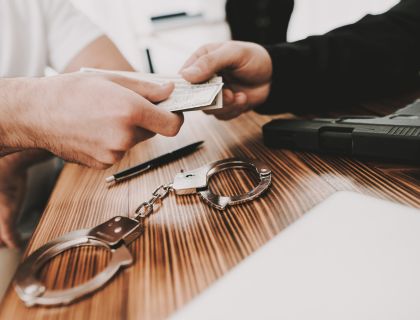 Perverting the course of justice, simply put, is any action taken to keep the offender or another person from receiving justice for a crime they have committed. At times, it can be a fairly minor charge, whereas in other situations, it can be a very serious criminal offence that carries a maximum punishment of up to 25 years in prison. The actual severity varies depending on the nature of the lie or omitted information, the severity of the crime that’s been covered up, the degree of planning and preparation that went into forming the lie, and other factors.
Perverting the course of justice, simply put, is any action taken to keep the offender or another person from receiving justice for a crime they have committed. At times, it can be a fairly minor charge, whereas in other situations, it can be a very serious criminal offence that carries a maximum punishment of up to 25 years in prison. The actual severity varies depending on the nature of the lie or omitted information, the severity of the crime that’s been covered up, the degree of planning and preparation that went into forming the lie, and other factors.
If you’ve been charged with perverting the course of justice, it’s important to get the best possible defence. At Josh Smith Legal, our experienced criminal lawyers can help you understand where you stand and help you build a defence against these charges. Read on to learn more about perverting the course of justice and how the Victorian legal system treats this charge.
How Serious Is The Crime Of Perverting The Legal System?
Although it can be relatively minor, perverting the course of justice can sometimes be a very serious felony. The type of behaviour, the length of time it lasted, and the degree of planning and preparation involved all influence how serious an offence is and the punishment meted out. Additionally, it is important to distinguish between different types of offences. For example, summary offences, which are less severe and typically tried in lower courts, contrast with more serious indictable offences that are handled by higher courts.
The court will examine the following factors when determining how serious a case of perverting the course of justice is:
- The situation
- The actions taken by the perpetrator and the environment in which they occurred
- The degree of planning and preparation made. This will lessen the accused's degree of guilt in cases where the offence "evolved" rather than proceeded as planned.
Achievement Or Not
In contrast to numerous other criminal crimes, an attempt to tamper with the course of justice is not much less severe in situations where the accused has little chance of success. Rather, the prospective repercussions of the attempted offence serve as a gauge for its seriousness.
Crimes Including Bail
The courts take attempts to force police to grant bail quite seriously. Obtaining bail by fraudulent means when it is not warranted is also taken extremely seriously. Similarly, if you receive a speeding fine that you believe is incorrect, contesting it properly involves gathering evidence, following legal procedures, and potentially seeking legal advice to ensure your case is heard fairly.
Helping The Offender Or Witness Run Away
There will be severe consequences for aiding a criminal in escaping the law. A person will also face a harsh punishment if they attempt to prevent witnesses from appearing in court to provide testimony.
Forming A Misleading Charge
If an accused person falsely accuses someone of a crime, they may be found guilty of perverting the course of justice. The degree of forethought and tenacity on the part of the offender, as well as the gravity of the repercussions for the falsely accused, will determine the accused's sentence. The incident will be considered less serious and could serve as proof of regret if the perpetrator later withdraws their unfounded charge.
Phoney Alibi
Since it tampers with the legal system and aims to persuade others to commit grave crimes, trying to get others to fabricate an alibi is a serious felony.
Hiding Or Misrepresenting Evidence
It's not always the case that efforts to hide evidence equate to tampering with the legal system.
Attempts To Influence Or Bribe Police Personnel
Even if the bribe is rejected, trying to bribe the police is taken very seriously. Any attempts to use violence or legal action to obtain the dropping of charges are taken even more seriously.
Which Court Will Hear The Matter?
The County Court hears cases involving extremely serious charges, like trying to pervert the course of justice and perverting it.
Protections
For the prosecution to establish guilt beyond a reasonable doubt regarding the accused's purposeful act and its intended purpose to pervert the course of justice, it must show that the accused person distorted the course of justice. It just takes proof of the first two of these components to convict someone of trying to sway justice. If the accused did not intend to pervert the process of justice or did not do the act to do so, that constitutes a defence to the allegation of perverting the course of justice. It is also possible to refute an accusation of perverting the course of justice by presenting disputed facts.
Conclusion
Perverting the course of justice is a serious crime that includes a wide range of actions meant to stop the legal process and keep people from getting justice. The seriousness of this crime is judged by looking at the actions themselves, how long they lasted, how well they were planned, and what effects they might have. Trying to change evidence, bribing police, making up charges, or trying to influence witnesses are all examples of perverting justice. All these actions harm the integrity of the legal system.


